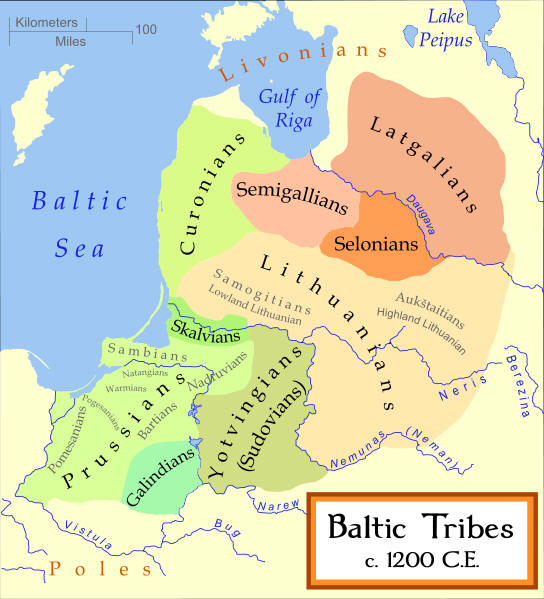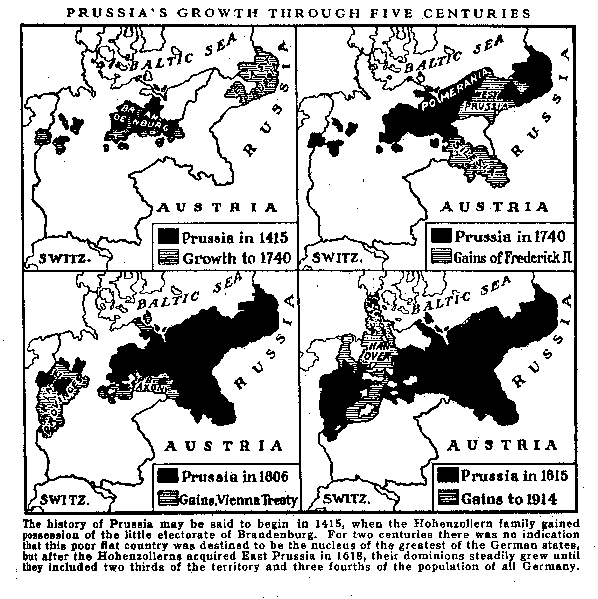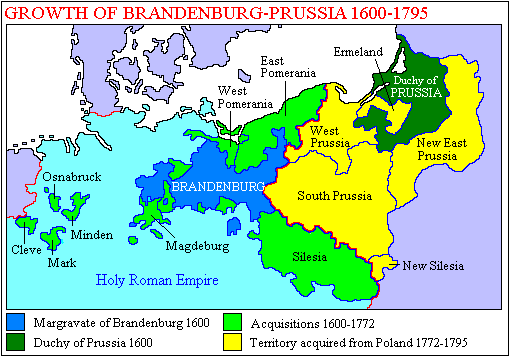|
Name |
Reign |
Hohenzollern Dukes of Prussia |
|
Albert |
1525-1568 |
Grandson of
Albert III Achilles, Elector of Brandenburg of the
House of Hohenzollern. Grand Master of the Teutonic
Knights. Having become a Lutheran, received from the
King of Poland the secular title of "Duke of
Prussia". |
|
Albert Frederick |
1568-1618 |
Son of Albert I. |
| |
|
Following the death of Albert Frederick in 1618, the
rule of the Duchy of Prussia passed to his son-in-law
and distant cousin the Elector John Sigismund, who
belonged to the senior branch of the Hohenzollern
dynasty that ruled the
Margraviate of Brandenburg. Though Margraviate and
Duchy remained legally distinct, the combined lands are
sometimes known as
Brandenburg-Prussia. |
|
John Sigismund |
1618-1619 |
Elector of Brandenburg from 1608. Married
Anna, Duchess of Prussia, daughter of Albert
Frederick. |
|
George William |
1619-1640 |
Son of John Sigismund and Anna. |
|
Frederick William |
1640-1688 |
Son of George William. In 1657, Frederick William
obtained from the
King of Poland recognition of his complete
sovereignty over the Duchy of Prussia, which thereby
became an independent state, though Poland retained the
right of reversion should the Hohenzollern dynasty die
out. The relative rights of the Duke of Prussia and the
King of Poland were established in a series of
treaties that were renewed on each change of ruler,
down to 1698 (accession of
Augustus II of Poland). |
|
Frederick |
1688-1701 |
Son of Frederick William. In 1701 he was crowned "King
in Prussia", marking the complete independence of
Prussia from all Polish ties, but limiting his
sovereignty to the former territory of Ducal Prussia. |
|
Name |
Reign |
Hohenzollern Kings in and of Prussia |
|
Frederick I |
1701–1713 |
Separated Prussia from Poland completely and assumed
sovereign status as "King in Prussia" in 1701. |
|
Frederick William I |
1713–1740 |
Son of Frederick I. Known as "the soldier king" (German:
Der Soldatenkönig). Reformed the army and limited
the state expenditure not related to the armed forces. |
|
Frederick II |
1740–1786 |
Consequent on his annexation of
Royal Prussia in the 1772
partition of Poland, Frederick the Great
changed his title to "King of Prussia" rather than "King
in Prussia". |
|
Frederick William II |
1786–1797 |
Nephew of Frederick II. Augmented Prussian territory
by further annexations of Polish lands. |
|
Frederick William III |
1797–1840 |
Son of Frederick William II. With the dissolution of
the
Holy Roman Empire in 1806, he lost the title of
Elector of Brandenburg, but was able to incorporate
his territories in Brandenburg into the Kingdom of
Prussia. Despite losses in the Napoleonic wars, at the
Congress of Vienna Prussia's territory in Germany was
greatly increased, making it the dominant power of
northern Germany. |
|
Frederick William IV |
1840–1861 |
Son of Frederick William III. During the revolutions
of 1848-9, he was given the chance to become King of
Germany, but turned down the offer. |
|
William I |
1861–1888 |
Brother of preceding. Prussia annexed further
territories as a result of the
Second War of Schleswig in 1864 and the
Austro-Prussian War of 1866, and became the dominant
power in the
North German Confederation. Following victory in the
Franco-Prussian War, William I was proclaimed
German Emperor in 1871, while retaining the title
and powers of King of Prussia. |
|
Frederick III |
1888 |
Son of preceding, Also German Emperor. Died after
only 99 days from throat cancer. Hence the year 1888 is
also known as
Year of Three Emperors. |
|
William II |
1888–1918 |
Son of preceding. The defeat of Germany in the
First World War (1914) led William's abdication and
exile and the fall of the House of Hohenzollern from
power. |


